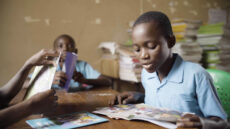On 21 February, International Mother Language Day, UNESCO calls on countries to pursue a policy of multilingual education. The Organization advises children to be taught in their mother tongue during the earliest years of their schooling, which can be combined with the official language of instruction, an approach known as multilingual education.
UNESCO’s World Inequality Database on Education shows that, globally, children being taught in a language they speak at home are 30% more likely to read with understanding by the end of primary school than those who do not speak the language of instruction. Evidence also shows that learning in a first language or mother tongue education improves children’s social skills.
“To help fight the current global learning crisis, while preserving linguistic diversity which is an essential cultural element, UNESCO urges governments to embrace multilingual education based on the mother tongue from the earliest years of schooling. We know it works – there is empirical evidence to prove it helps children learn.” Audrey Azoulay Director-General of UNESCO.
Supporting Africa, the continent with the highest linguistic diversity
UNESCO particularly calls on the international community to support the African States in their actions to develop multilingual learning. A recent report from UNESCO, Born To Learn, shows that at most one in five children are taught in their mother tongue in Africa, the continent with the highest linguistic diversity. This is detrimental to learning outcomes on the continent, where only one in five pupils master the basics of reading, writing and mathematics even after completing primary school.
UNESCO points to the success of Mozambique, which recently expanded bilingual education to 25% of schools with a new teacher training curriculum. Children learning in these schools are performing around 15% higher in basic reading and mathematics. For this success to extend to the entire continent, the international community must mobilize more funds for African countries investing in this area.
On Mother Language Day, UNESCO also reminds the world of the importance of safeguarding indigenous languages. At least 40% of the more than 6,700 languages spoken around the world are threatened with extinction in the long term, due to a lack of speakers.
UNESCO leads the Indigenous Languages Decade 2022-2032, a ten-year action plan to draw the world’s attention to the critical loss of indigenous languages and the urgent need to preserve, revitalize and celebrate them.

